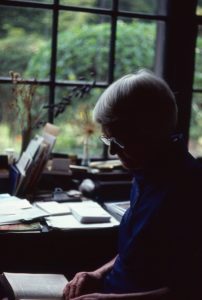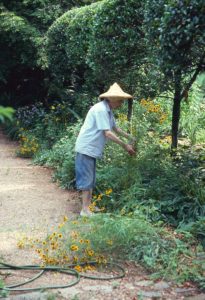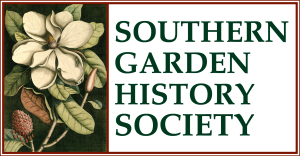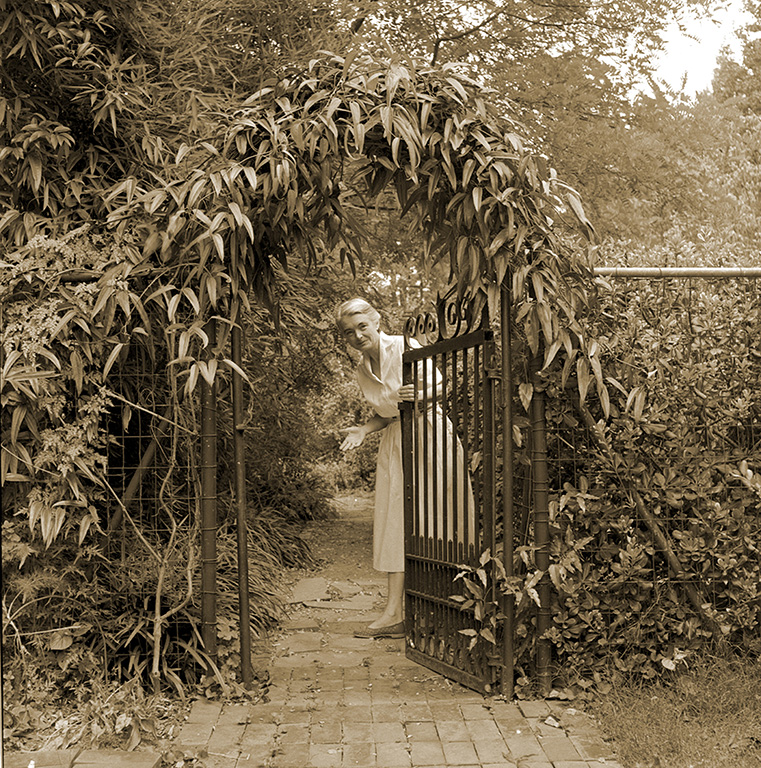Elizabeth Lawrence (1904-1985) is best known as an American garden writer—one of the finest of the 20th century. Through a highly informative yet conversational style of writing, she encouraged her readers to embrace diversity in their gardens by trying something new. Even though she often wrote of her own experiences in her two Southern gardens in North Carolina (Raleigh until 1948, and Charlotte from 1948 to 1984), her audience and correspondences spanned the entire country… and beyond. She invited her readers to accompany her on a journey into her garden—
“… not only into my garden, but into the world of gardens—a world as old as the history of man, and as new as the latest contribution of science; a world of mystery, adventure and romance; a world of poetry and philosophy; a world of beauty; and a world of work.” (Elizabeth Lawrence, the Charlotte Observer, August 11, 1957)
Elizabeth enjoyed pushing the boundaries in her garden. Hers was a garden of experimentation that fed her constantly curious mind. She was incredibly well read, and studied information about all kinds of plants. She documented and catalogued everything she learned with what Eudora Welty later recalled as “a schoolteacher’s love of accuracy.”

As all gardeners do, Elizabeth met with success and failure, and was not shy about sharing both with her readers. That kind of honesty in garden writing is so refreshing. Her writings are intimate; subtle wit and poetic prose takes reading from being a sole endeavor to feeling like a conversation. She infused just enough of herself personally to make you feel as if she is talking just with you. Even those who aren’t gardeners will find her writing engaging. To me, that’s the essence of what makes her writings still so loved today.
The same intimacy, honesty and curiosity translates to her Charlotte garden. It is a personal space—you feel embraced but never enveloped—where the heart beats a little slower. Elizabeth’s landscape architecture training is immediately evident, but it is not until you have studied her that the subtlety and magic of it truly comes to light (at least not for me). To Elizabeth, “proportion is all.” The success of her design is rooted in the proportional relationship of person to garden, and radiates out from there. Her near obsession with color gave her an artist’s sensitivity to combining plants, while her desire to have something always in perfection of flower or fruit created a seamless blend of one season into the next.

Friends and visitors all came away with the same impression: Elizabeth’s garden was a peaceful place—dynamic and full to the brim with plants, and never the same experience twice. A visitor once excitedly stated that she could tell her gardening friends she’d seen “the famous Elizabeth Lawrence’s garden”—to which Elizabeth somewhat flatly replied, “You have not seen my garden… you have only seen it today.”
Since 2008, the Elizabeth Lawrence House & Garden is owned and operated by the Wing Haven Foundation, and is managed in partnership with the Garden Conservancy. It is open to the public as a horticultural and historic resource. As Garden Curator, my job is to see the garden through Elizabeth’s eyes and interpret that for the public as honestly as possible. I am on a quest to bring her back to life through her garden. (Not like in a Dr. Frankenstein kind of way.) It is the single hardest part of my job, and definitely the most rewarding; after almost ten years at it, I can see her there more clearly with each passing season. The garden is still experimental, as it was for Elizabeth, although on a decidedly smaller scale. It is always changing, with something new in bloom nearly every day of the year, and it is still true that visitors do not see Elizabeth Lawrence’s garden… they only see it that day.
Andrea Sprott is Garden Curator of the Elizabeth Lawrence House & Garden in Charlotte, North Carolina. She is primarily a self-taught gardener and admitted plantaholic. She, her husband Herb, three dogs and one cat live on two acres, where, as Herb says, she grows “every plant known to man, and a few that aren’t”.


Billie Bryant
would enjoy the essays on gardens and gardeners. Thank you.
Frances Way
Wonderful article!